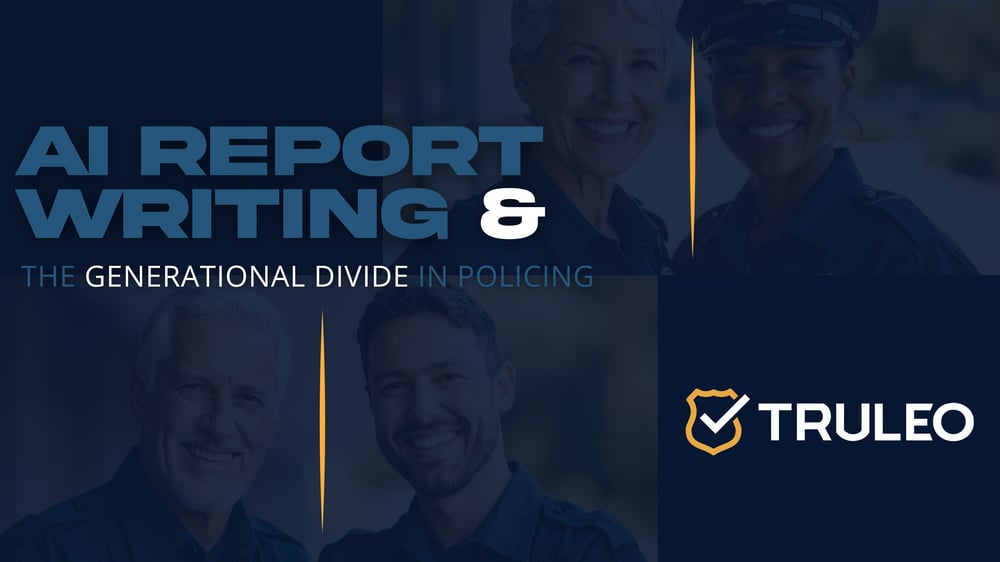AI Report Writing and the Generational Divide in Policing
Technology Artificial Intelligence BWC review AI report writing voice-generated reports Jun 26, 2025 9:00:00 AM Anthony Tassone 3 min read

Artificial intelligence is reshaping the way we work across nearly every industry, from medicine to finance to law enforcement. For the modern police officer, artificial intelligence isn’t some distant concept; it’s already here, embedded in tools designed to simplify daily tasks and make policing more effective.
Nowhere is this transformation more visible than in the realm of report writing. For years, writing police reports has been one of the most time-consuming and mentally taxing parts of the job. Today, the ability to voice-generate reports with AI-powered field report software is promising to alleviate that burden. But as recent findings show, not all tools are created equal, and not all officers are on board.
Beyond the Hype: What the Research Says
A recently published study in the Journal of Experimental Criminology titled “Writing at the Speed of Hype” examined officers’ real-world experience with Axon’s AI report writing tool. While the company has publicly marketed the product as a revolutionary time-saver, independent research tells a different story.
Officers who used this tool during a randomized field trial did not complete their reports any faster than those using traditional methods. In fact, many officers cited issues with the tool’s interface, inaccurate translations of body-worn camera footage, and the need for extensive editing, all of which neutralized any time savings the AI was supposed to offer.
While supervisors noted some perceived improvements in report completeness and detail, 52% of officers reported functional problems that hindered performance. Simply put, this approach failed to deliver on its promises. It's a cautionary tale about what happens when hype outpaces human-centered design.
Human Judgment Still Matters
The core issue with this approach lies in its attempt to replace human judgment. The software converts body-worn camera footage directly into written narratives, often skipping the crucial interpretive step that allows officers to explain context, tone, and intent, all essential to a high-quality police report.
By contrast, TRULEO’s voice-generated report solution is designed to assist, not replace. Officers speak naturally, describing the incident in their own words. The AI listens, prompts for clarity when needed, and produces a clean draft in real time. The result is a more accurate, efficient workflow that preserves the officer’s voice while significantly reducing administrative burden.
This is the future of artificial intelligence for police officers: not automation for the sake of it, but augmentation that respects the expertise and experience of the people doing the job.
The Generational Divide: Tradition vs. Innovation
AI tools in law enforcement are revealing more than just technical challenges; they’re exposing a cultural fault line.
Veteran officers, many of whom built their careers on grit, memory, and manual skills, often view AI tools with skepticism. They take pride in knowing radio codes by heart, writing detailed narratives without assistance, and navigating the streets from memory. For them, AI tools can feel like shortcuts, or worse, like an insult to their professionalism.
Younger officers, on the other hand, have grown up in a tech-forward world. They rely on real-time GPS, CAD systems, and voice-to-text functions in their everyday lives. For this generation, using TRULEO isn't cutting corners; it’s common sense.
These differing worldviews create tension in a profession where consistency and culture matter deeply. But just as policing adapted from typewriters to computers, from radios to MDTs, it will evolve again, merging tradition with innovation.
Efficiency Isn’t Laziness — It’s Strategy
Critics sometimes frame AI-assisted tools as a sign of laziness, but that misses the point entirely. The goal isn’t to do less; it’s to do MORE, better and efficiently. By offloading repetitive tasks and administrative work, artificial intelligence in policing can give officers more time for what matters: community engagement, investigations, and proactive crime prevention.
In fact, over 20,000 voice-generated reports have already been created in 2025 using TRULEO’s system. Departments are discovering that when designed correctly, these tools can reduce officer burnout, increase consistency, and boost morale — all without sacrificing report quality or officer judgment.
What Law Enforcement Leaders Need to Know
The path forward requires discernment. As the study revealed, technology that claims to “save time” but demands constant editing and lacks user-centered design will fall flat. Departments should be wary of flashy marketing and instead demand real results, backed by independent research and frontline feedback.
Adopting artificial intelligence for police officers isn’t a matter of simply plugging in a tool and walking away. It requires structured training, thoughtful implementation, and feedback loops that ensure the technology is enhancing (not replacing) the skills officers have spent years developing.
Conclusion: Building the Future of AI in Policing
Technology will not wait. Vendors will continue to roll out tools that promise everything from faster reports to fully automated workflows. But only those that understand the unique demands of law enforcement — and build technology that respects both the job and the officer — will last.
AI isn’t here to make policing impersonal. It’s here to give time back to the people who’ve sworn to protect and serve. But only if it’s done right.
If you're a department evaluating report writing software, the question you should ask isn’t just “Does it work?”; it’s “Does it work for us?”
Because when the tool respects the culture, the officers, and the workflow — the results speak for themselves.

Anthony Tassone
Anthony comes from a proud military and law enforcement family, built communication intelligence platforms (COMINT), and serves as a board member of the FBI National Academy Associates (FBINAA) Foundation. He travels the country teaching trusted law enforcement leadership organizations, such as FBI LEEDS, about the practical use of artificial intelligence in policing. He received his bachelor’s degree in Computer Science from DePaul University and lives in Greenville South Carolina with his wife and four kids and is an avid bowhunter, rescue diver and triathlete.